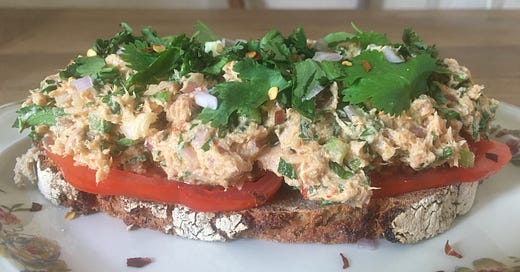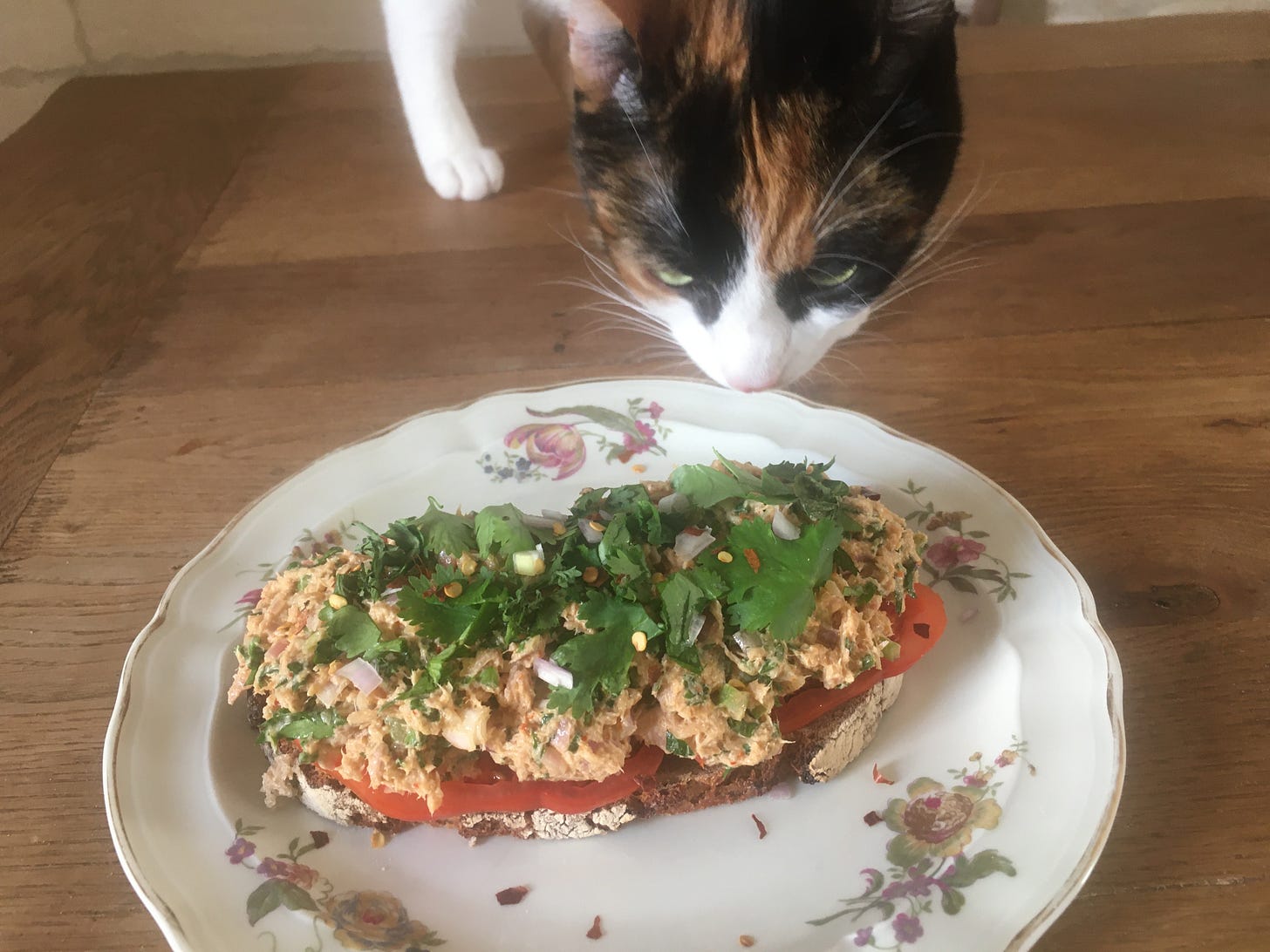Strange Case of Dr. Jekyll, Ms. Instagram and the Tuna Sandwich
The two faces of everyone (and lunch)
I had a cousin visiting from the States last week. I haven’t seen her since she was a college kid, now she’s a glorious thoughtful independent woman in her 30s with a real job, a 2 bedroom apartment, and a serious skincare routine (note to self: start a side business importing Avene).
I feel like I spent the whole visit asking questions, acting like an cultural anthropologist, digging for dirt on my own country. Some of my questions were cultural, some generational. She works for a company that has unlimited vacation. Very forward, I think. What’s dating like these days? Who pays? Do you disqualify for grammar and spelling mistakes in texts? Does your phone make your life better or worse? She has lots of international friends from business school, a break, she said, from the relentless political correctness of American academia. I certainly understand that. I can’t tell you the number of times being a foreigner in France has allowed me to ask a question that no other person in the room would dare.
She also told me tinned fish was a thing in the US now. My grandpa Eddie used to tell me a story about sardines, squished in their can, one’s smelly feet next to the other one’s head. I thought it was hilarious. Apparently, sardines are back.
Does your phone make your life better or worse? Of course we didn’t answer that one. I think she mostly came down on neither. For her, the phone, and the sharing that goes with it, is just a fact of life. As we were walking around, she was compiling a very useful list of best restaurants and flakiest croissants in Arles for her circle. I’m 15 years her senior, and more ambivalent. I would say my phone makes my life both better and worse. As a person who can’t navigate themselves out of a paper bag, GPS is a lifesaver. Yesterday, we were talking about Don Quixote at the dinner table. I remember enough of my literary education to tell my son it is often considered the first “modern novel”, but not enough to tell him why. Thank you Google. A late night YouTube clip of the Felicity/Ben almost kiss? Yes, please. I love lots of what my phone gives me.
But. Call me an only child, it’s the sharing part that gives me pause. What do I give my phone? What does the internet want from me?
What to share, where and with whom are the existential questions of our time. It’s true for natural resources, taxes, and that fabulous burrata with roasted beetroot sandwich you had for lunch.
We all have a double identity these days. I live a charmed life, I go the market twice a week and post pics of fresh figs or knobbly celery root. I feel worthless and have trouble getting out of bed several days in row. Both of those things can be true at once. Both of those things ARE true at once. That’s human-ness, that’s life. The complexity, not the smooth surfaces.
When I’m struggling, my instinct is to hide. That’s what I would do if I had a normal job, I would go into the bathroom stall to cry. When my mom died and I stopped communicating with readers for 5 years, that’s exactly what I did. I thought I’d hide until I had myself all sorted out, neatened up, presentable. But that’s never going to happen, so here I am.
My books took years to write; they are the embroidered linen handkerchief version of my life. But that takes time, reflection and distance – exactly what the internet doesn’t give us. The internet is a crumpled tissue. And just like I would be if I came out of the workplace bathroom with mascara running down my face, I’m terrified what the world will think. Of not controlling the narrative. But I’m also intrigued. What would it be like to share Dr. Jeykll and Ms. Hyde.
I’m a memoirist; I should be used to telling my story. But before that I was an art historian and culture journalist, so I also know how terrible most artists are at interpreting their own work. You think you’re doing one thing; the effect is something else entirely.
I’ve thought a lot lately about why food is the subject I keep coming back to, in writing and in life. My husband and I have been fantasizing about our next dream spot. He wants a view. I can’t imagine living anywhere where I can’t eat well. (If it has nearby water for skinny dipping, so much the better.) Food is the thing that allows me to integrate my various selves. It permeates every aspect of my life, answers questions of memory, sustenance, culture. I make it when I’m having a great day and a bad one. I eat it alone for comfort and with loved ones to celebrate. I have to feed Dr. Jekyll and Ms. Hyde. Everybody’s gotta eat.
And with that, I’m off to make use of some trendy tinned fish and prepare a tuna sandwich, or rather a tartine de rillettes de thon. I think that might be next week’s topic: Why everything sounds better in French.
Rillettes de Thon (French style Tuna Salad)
I loved my mother; I hated her tunafish. Pungent with raw white onion, soggy with mayo, it gave me a sandwich phobia. For most of my childhood, I wouldn’t eat anything stuck between two slices of bread. Thankfully, 20 years in France (and many a side trip to Spain) have turned me around on preserved fish. A glass jar filled with big hunks of white tuna now makes me think of tapas bars and Muscat, not sand-in-my-bathing-suit childhood picnics.
What Americans know as “Tuna Salad” and the Brits call “Tuna Mayo” (they put sweetcorn in it…yick) the French call Rillettes de Thon. Traditional French rillettes are made with goose or pork cooked in their own fat. (Rabelais called it confiture de cochon – pig jam). Rillettes can be a picnic sandwich filling, or a spread served with drinks and toasted slices of day-old baguette. For me, they are part of that thrifty French habit of making a little bit of protein (and a lot of fat) go a long way. The term rillettes has evolved over time to cover fish spreads - canned fish (tuna, salmon, mackerel, even crab) mixed with mayo, crème fraiche or yogurt and herbs and spices. Here's my version.
2 cans of tuna packed in olive oil, drained
2 good pinches coarse sea salt
Good grind of black pepper
2 teaspoons Nõra pepper flakes (sweet Spanish chili pepper - adds depth, not heat), or ½ tsp paprika (not smoked)
1 generous pinch pumpkin pie spice
1 generous pinch cumin
Juice of one small lemon or lime
1 medium shallot, finely diced (about ¼ cup)
2 small stalks of celery with leaves, diced
3 tablespoons flat leaf parsley, finely chopped
1/3 cup plain yogurt (2% or above)
2 large slices of sourdough or rye bread
4 thin slices tomato
Cilantro leaves and hot pepper flakes to garnish (optional)
In a medium mixing bowl, combine the drained tuna with the salt, pepper, spices and lemon juice. I do this with a fork to break up the tuna as I go. Add the shallot, celery, parsley, stir to combine. Add the yogurt, stir to combine. Adjust seasoning as needed. Cut a nice sized slice of sourdough or rye. Top with two thin slices of tomato, half the tuna salad, and some coriander leaves and hot pepper flakes if you like. Bon appétit!
Makes two generous tartines (and one jealous cat)
Know someone who is ambivalent about their phone? Someone who eats? (That covers everyone, doesn’t it?)
If you’re not already a subscriber, please do!
PS – I’m too much of a persnickety English major to leave you without apologizing for the inversion in the post title. A proper analogy to Robert Louis Stevenson’s 1886 Gothic novel Strange Case of Dr. Jekyll and Mr. Hyde would be Dr. Instagram (the socially acceptable facade) and Ms. Hyde (the sicko). I went with name recognition over facts. Yup, I’m part of the problem
Where do you draw your boundaries for online sharing? Do you have a Gothic novel to recommend? Are you a Brit who would like to defend sweetcorn in your tuna?








I can nearly taste it while reading the article. I'm off to the market now as I need coriander. Thank you
👍🙂